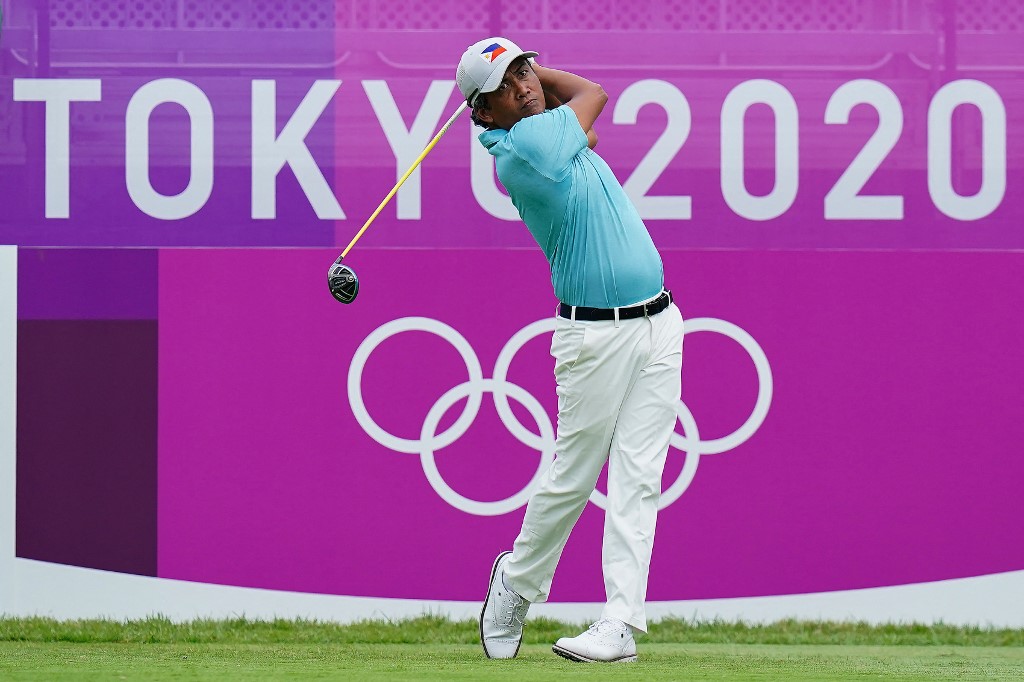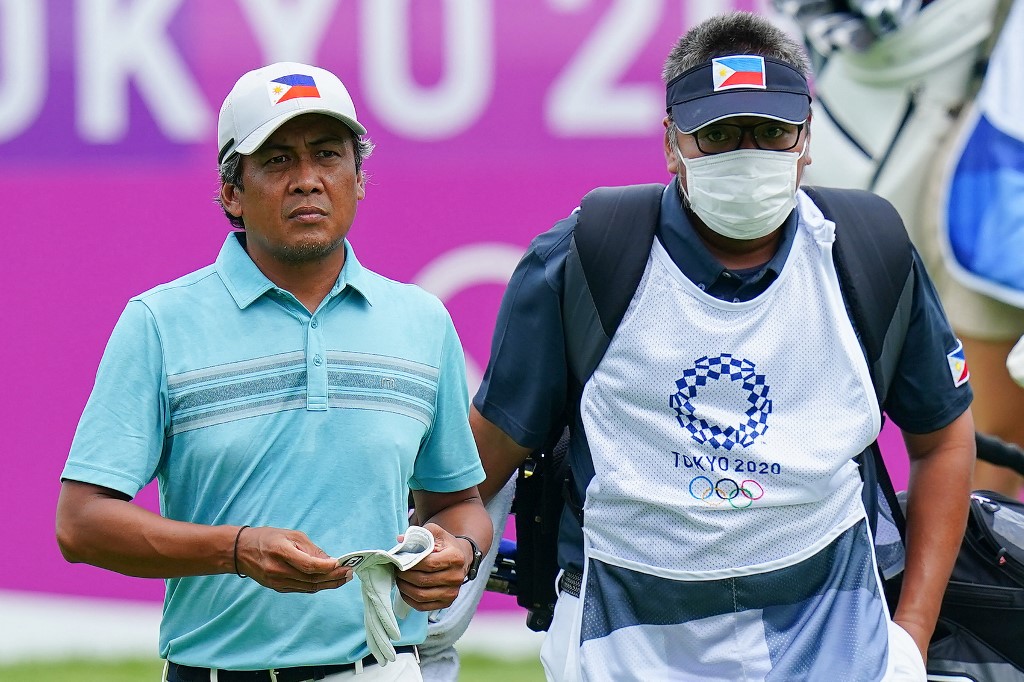Juvic Pagunsan upstages some of the biggest names in golf

Philippines’ Juvic Pagunsan watches his drive from a tee in round 1 of the men’s golf individual stroke play during the Tokyo 2020 Olympic Games at the Kasumigaseki Country Club in Kawagoe on July 29, 2021. (Photo by YOSHIHIRO IWAMO / AFP)
Not really regarded as a strong bet to win gold in men’s golf in the Tokyo Olympics with some of the biggest names in the world taking part, Juvic Pagunsan handled the challenges of a demanding course with the ball-striking talent of someone digging for gold as the Philippine bet fired a five-under-par 66 to join the early frontrunners after the opening 18 holes.
The 43 year-old firebrand joined a band of lower-ranked players who upstaged some of the game’s megastars by maneuvering his way around the 7,466-yard Kasumigaseki Country Club with such consistency that produced six birdies and a lone three-putt bogey.
Article continues after this advertisementPagunsan’s opening effort was good enough to put him in just three strokes behind another longshot, Austrian Sepp Straka, who took the solo lead by a stroke on a day marred by a one and a half hour delay due to the threats of lightning.
“I managed my round very well, putting was very good today,” said Pagunsan. “I made birdie on the first which helped. I’m so nervous as this is the first time in a long while that I’m representing the country.
“It’s very different from a regular (pro) tournament,” added the Japan Tour’s reigning Mizuno Open champion.
Article continues after this advertisementThe towering Straka jumped the gun on the star-studded field with a bogey-free 63 built around four birdies—including three in a row from the 13th—in his last six holes.
Right behind Straka was Asian Tour standout Jazz Janewattananond of Thailand with a 64, then came Thomas Pieters and Carlos Ortiz with similar 65s.
Yielding the prime positions of the leaderboard to the lesser lights were Norway’s Viktor Hovland and American Patrick Reed, who had 68s, and recent British Open winner Collin Morikawa of the US, Rory McIlroy of Ireland and Masters champ Hideki Matsuyama, who were all bunched at 69.
Pagunsan was already three-under when play was called shortly before 2 p.m. after he birdied the first, three-putted the fourth then birdied Nos. 6, 8 and 11th.
When play resumed, Pagunsan’s fresh legs helped him to a big finish.
He buried a long 30-footer for birdie on the 13th and parlayed a perfect tee-shot on the 16th into a five-footer for his sixth and last birdie.
Pagunsan had a good chance at another birdie on the 17th, but his putt from eight feet lipped out.
“I managed my round very well, putting was very good today,” said Pagunsan. “I made birdie on the first which helped. I’m so nervous as this is the first time in a long while that I’m representing the country. It’s very different from a regular tournament.”

Philippines’ Juvic Pagunsan (L) walks with his caddie in round 1 of the men’s golf individual stroke play during the Tokyo 2020 Olympic Games at the Kasumigaseki Country Club in Kawagoe on July 29, 2021. (Photo by YOSHIHIRO IWAMO / AFP)
Straka was cooling off in the clubhouse before the break was called, and savoring a return to form after a dire period on the US PGA Tour.
“If you put it in the fairway on this course, you can really take advantage,” Straka told reporters after rolling in eight birdies in a blemish-free round.
“I got hot with my irons, especially my short irons, my wedges. I was really knocking down the flagstick and really tried to stay aggressive.”
Matsuyama, carrying Japan’s medal hopes on his shoulders, said he felt the lingering effects of COVID-19 as he ran out of gas on the back nine.
Matsuyama had four birdies in his first eight holes before bogeys on nine and 11 stalled him.
“It was very difficult. Towards the end, mental side and focus faded away from me,” said the burly 29-year-old, Japan’s first major winner.
In such a golf-mad nation, Matsuyama deserved a crowd, but the lack of spectators due to COVID-19 made for a surreal atmosphere. With reports from Reuters